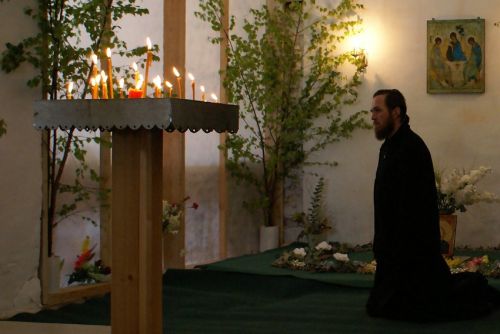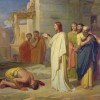Source: St. Mary Magdalene Orthodox Church
In the prayers of the faithful said during the Divine Liturgy a special petition for the faithful is offered, that they “grow in faith and life and spiritual understanding.”
As a priest, I take these words to heart, knowing that, to a great extent, I am the one responsible to God for whether such growth occurs or not. For those ordained to the priesthood, this is a uniquely heavy burden. Why? Because we know that the line that separates growth and stagnation in the endeavor of faith is an extremely fine line indeed. The devil, whose malice towards the human race is from the beginning of time, knows that the best approach to frustrating growth is to distract us, little bit by little bit, from the task. What makes this especially difficult is the fact that this temptation to stray away from “the one thing needful,” though relentless in nature, is barely imperceptible. Like a boat unleashed from its moorings that slowly but surely floats away from a safe harbor, so does the soul gradually lose its vitality and strength by turning its “inner eye” from uncreated light of Christ to the vanity of the world. Christ speaks of this in His Sermon on the Mount. “The eye is the lamp of the body. So, if your eye is sound, your whole body will be full of light; but if your eye is not sound, your whole body will be full of darkness. If then the light in you is darkness, how great is the darkness!” (Mat. 6:22,23).

So the point here is that growth in faith involves keeping watch over the heart. We must discover a deeper awareness of what the hidden movements of the heart are, of how such movements are at any one time inclined towards good or evil, and of where these hidden movements are leading – towards the light or the darkness.
In addition to this, the holy fathers say that this kind of inward sensibility (and sensitivity) is the essence of the spiritual life, and that those who are lacking of this are those who live not as human beings, but who live “like the beasts.” Or in St. Basil’s words, are “even worse than the beasts” because the beasts at least, in their simplicity live according to the purpose that God had in mind for them when they were first created. Conversely, the “carnal man” is the one who lives “for the flesh,” and judges the inner experience of the spiritual life as nothing more than the fanciful imagination of religious idiocy.
Which here proves that the question is really all about how to enlighten, enliven, and enlarge the heart of man that lies hidden, as “a pearl of great price,” beneath the physical, intellectual, psychological, and emotional layers of our existence. The greatest poverty of the postmodern world is the fact that there are few who truly know the greatness of the gift that lies so incredibly close to us. It’s as St. Augustine says, “Men go forth to wonder at the heights of mountains, the huge waves of the sea, the broad flow of the rivers, the vast compass of the oceans, the courses of the stars: but they pass by themselves without wondering whatsoever.”
That the heart is what makes us most human is also why Orthodoxy attests to all that is needed in order to gain an awareness of the “inner man.” But what is needed? What is first needed comes straight from the teachings of the gospel, that we observe the commandments by refraining from gluttony and drunkenness, from fornication and adultery, from greed and theft, and from every other transgression that leads to the state of “dissipation.” When the rich young Jewish Ruler came to Jesus in the gospel and asked, “What good thing must I do in order to inherit eternal life?” Jesus replied, initially at least, by saying “Keep the commandments,” only because it is the commandments that begin the process of the inner cleansing the senses. Yes, there must be faith in Christ, in addition to, or rather as the consummation of the commandments, which is what the Rich Young Jewish Ruler was told. But even so, if the human soul is a window that opens up to heaven, it becomes self-evident that nothing of heaven will ever be seen as long as the glass is coated with the grit and grime of sin. Thus, the measure that one observes these basic commandments is the measure to which one is being cleansed of that which darkens and suffocates the human soul. Growing our hearts means enlivening the soul through the cleansing of the passions. This is the first aim of the spiritual life.














